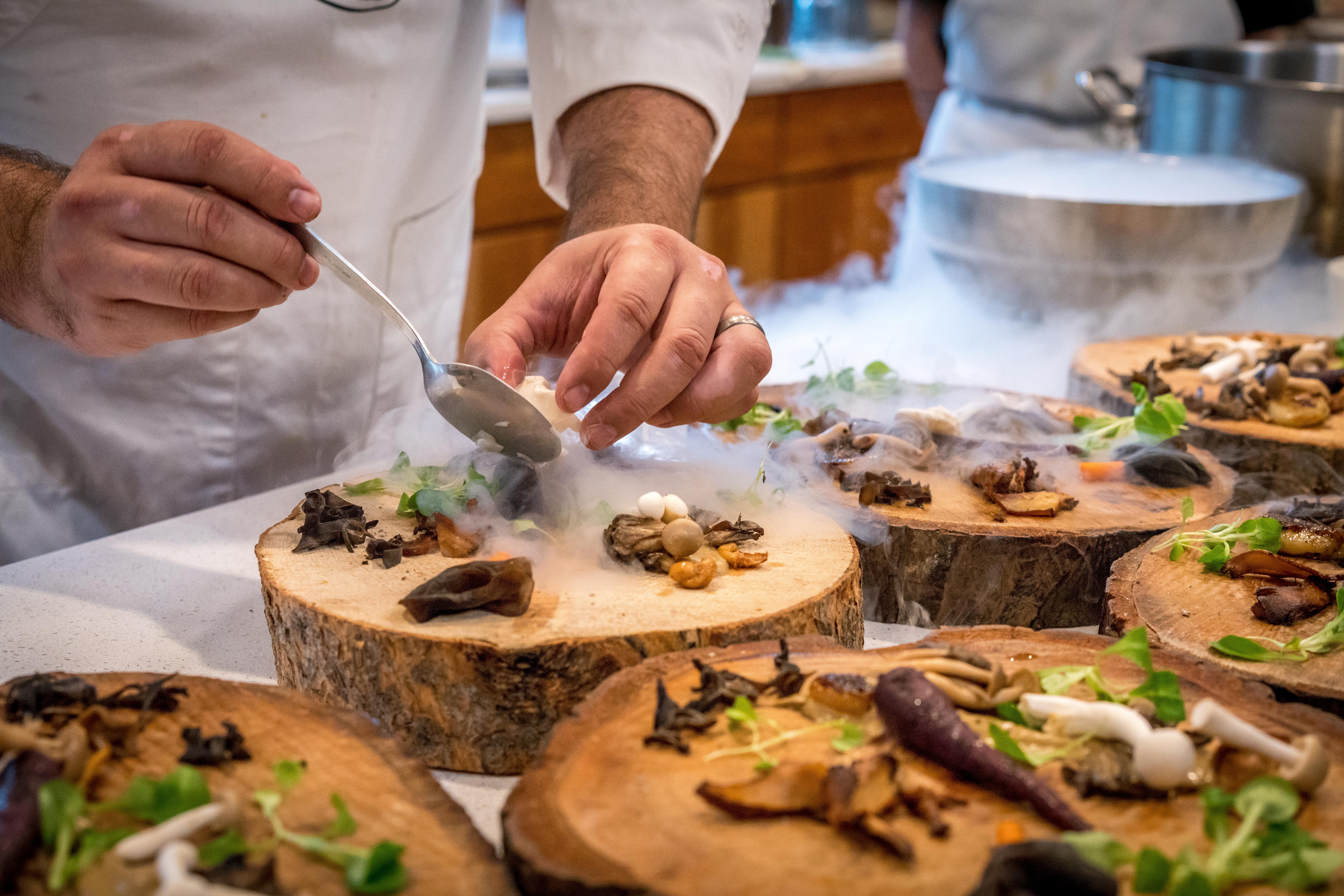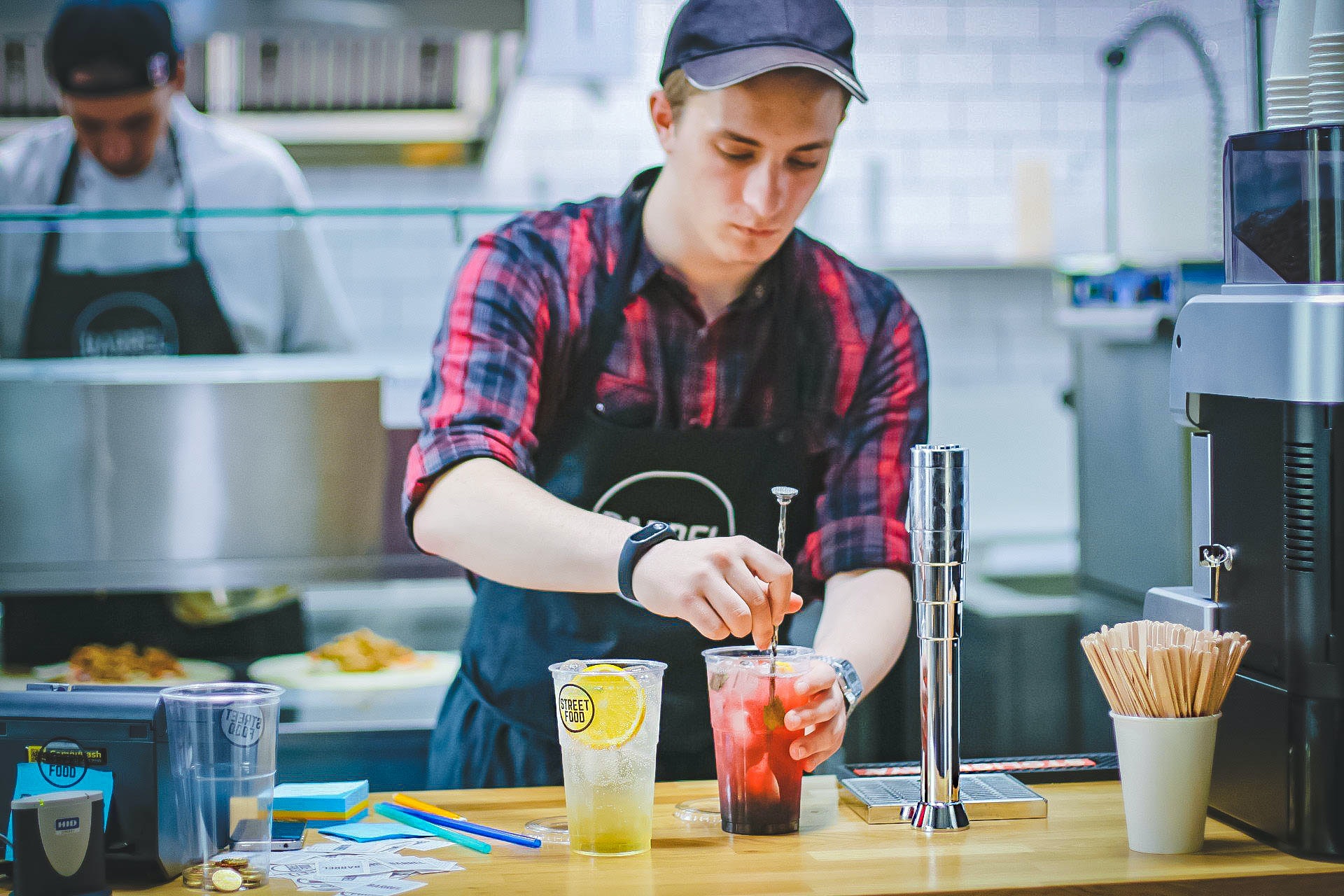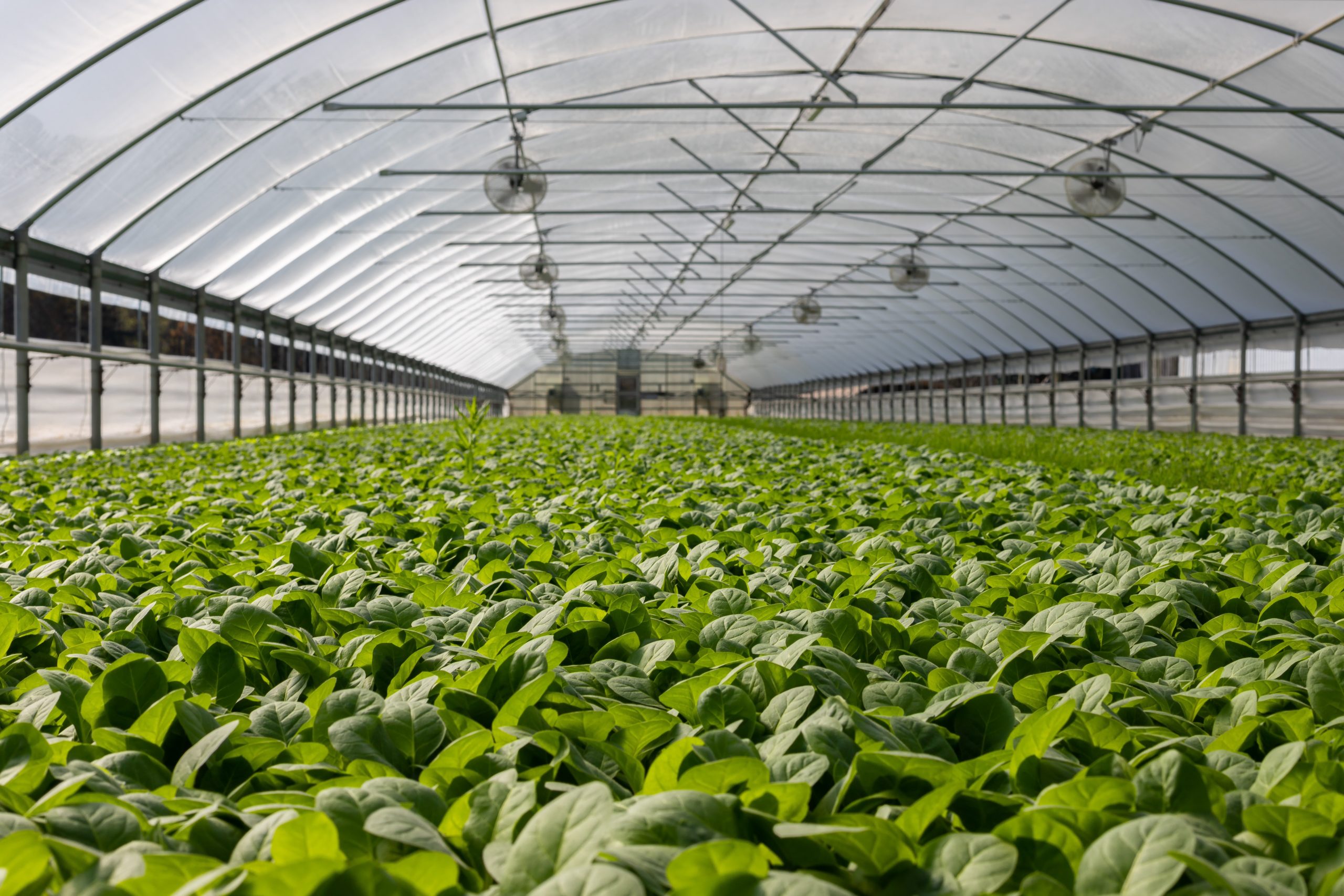The B2B food industry is one of the most cutthroat business arenas you can enter, thanks to the perishable nature of the products and the high demand from consumers.
This was largely the case for the traditional B2B food industry for decades. Fortunately, the introduction of automation, online selling, and widespread access to the internet have made things a lot easier for B2B enterprises today.
With the growth of e-commerce, the B2B food and beverage market is also moving toward online selling structures to reach wider audiences.

The global B2B food and beverages e-commerce market is expected to be worth $797.3 billion by 2030, going strong at a compound annual growth rate (CAGR) of 16.97% between 2022 to 2030. Such momentum in the B2B food industry prompts tough competition among firms that want to succeed today and in the future.
Read on to learn more about the B2B food industry, current trends, challenges, and examples of B2B marketplaces.
What is a B2B Firm?
A business-to-business (B2B) firm provides goods and services for sale to other businesses. This is in direct contrast to B2C (business-to-consumer) enterprises that sell directly to individual customers.
The B2B Food Industry
In the food industry, a B2B firm is any business that sells products to other food businesses.
Clients of B2B firms are typically restaurants, hotels, caterers, and other B2B or B2C food businesses.
Examples of B2B Products in the Food Industry
B2B products in the food industry can be divided into two types: fresh and processed foods. Examples of products under these categories include chilled ingredients, dairy products, groceries, beverages, and more.
Here are some examples of B2B product categories in the food industry:
- Ready-to-eat meals
- Dairy products
- Snacks and nutritional bars
- Bakery and confectionery
- Poultry and seafood
- Diet snacks
- Canned and processed food
- Processed meat
- Beverages
- Ingredients
- And more.
Business Models in B2B Food Industry
B2B firms operate using a different business model than traditional B2C businesses. A popular model is the B2B marketplace.
Here are some of the business model options for B2B sellers to sell their products online:
- Buyer-oriented marketplaces
- Supplier-oriented marketplaces
- Intermediary-oriented marketplaces
Buyer-oriented marketplaces have a small number of buyers and are typically owned by buyers. Seller-oriented marketplaces have fewer sellers and are owned by sellers.
Intermediary-oriented marketplaces are the most common type of marketplaces today. These B2B marketplaces are run by a third party or intermediary for free or a fee. They host multiple sellers and buyers on their platform and encourage transactions among them.
Depending on their complexity, intermediary-oriented marketplaces can be used to find buyers or sellers you can contact off the platform. They may also facilitate communication, ordering, and payment.
B2B companies typically offer products or services in large quantities or a long-term subscription model. This means the amount of money involved is also quite high. Such purchases take a long time and require a complex decision-making process. Thus, selling products within the B2B industry involves complex sales strategies.
When developing strategies for sales in the B2B food industry, it is crucial to analyze market trends, opportunities and challenges to find the best solutions for your business.

B2B Food and Beverage Industry: Trends and Opportunities
The B2B food and beverage industry presents many opportunities for buyers and sellers to scale in the next few years. Some of these opportunities come in the form of these popular trends:
Technological Advancements
Tech-enabled services, app-based ordering platforms, automation, robotics, and smart packaging—technology is quickly transforming the food industry.
And as technology takes business operations to the next level, demand continues to grow exponentially. Consumers, buyers, manufacturers, distributors, logistics partners, and other food business entities are increasingly realizing the benefits of such advances.
From lowered costs and streamlined payments to improved reach and automated ordering, technology makes B2B transactions simpler and more profitable for everyone involved.
Forward-thinking businesses that will adopt such technologies sooner will be the ones to benefit the most.
Direct-To-Consumer (D2C)
An unprecedented trend in the B2B food industry was the growth and shift of B2B structures to D2C. This was born from the demand created during the pandemic, specifically home deliveries.
B2B suppliers were given a chance to step up to the task. The increased profits from no longer paying intermediaries and increasing the sales net for businesses and consumers are huge.
And B2B firms that are ready to take on this newly-created demand are certain to win the game in the future of B2B.
Increased Urbanization
Urban infrastructure and lifestyles have increased the demand for out-of-home (OOH) food products and services, such as ready-to-eat meals, on-the-go snacks, nutrition bars, and processed food products.
Consumers also want easy access to these food products, often in large quantities. This increases the pressure on B2C companies to deliver food items to consumers and on B2B firms to provide consistent deliveries on shorter schedules.
Shifting Consumer Consumption Patterns
The pandemic changed many things about the way people consume food. There was a marked decrease in the consumption of fresh foods and an increase in demand for foods with much longer shelf life. These adjustments have created strong ripples throughout the food industry, especially in B2B firms.
With technological advancements helping businesses predict and track behavior and emerging trends, consumers expect businesses to adapt to these changes as quickly as possible.
Local Food Production
The need to grow and source produce locally has seen a high demand after the many supply chain disruptions worldwide.
One such development is the popularity of indoor farms that can supply commercial-scale produce to local buyers.

Food Transparency and Traceability
The demand for increased transparency is affecting all sectors of the food industry. The reason for the demand is the rising number of fraud incidents and product recalls, which caused a loss of trust on the part of the consumers.
Traceability is the best solution to this problem. B2B players that successfully incorporate transparency into their operations will see a massive increase in support in the near future.
Demand for Supply Chain Visibility
After the many supply chain shortage issues in the last few years, it was only natural for the demand for visibility to grow. Consumers and buyers want more transparency in terms of product availability and the promise of timely delivery so they can allocate labor and other resources as needed.
If you’re a B2B supplier that can provide premium deliveries on request, you can expect a premium share of the buyer market.
Expanding eCommerce Presence
According to Statista, eCommerce revenue from the food and beverage industry alone will reach $47.6 billion by 2025. This means B2B food industry market players will have to establish their eCommerce presence soon to get a share of that revenue.
Challenges in the B2B Food and Beverage Industry and Their Solutions
The unique structure and business model of the B2B food industry make it a highly competitive sector. Here are some of its biggest challenges:
Demand for Faster Delivery
Tight shipping schedules are one of the few norms of the food industry, whether it is the B2C model or the B2B model.
The reasons for such short delivery deadlines are many. Some of the most common across the globe include:
- Perishable nature of food products
- Shorter shelf life of processed products
- Demand from consumers
- Competition between B2C firms
- And more.
While these deadlines are challenging for most businesses, they’re also opportunities to rise above the competition. Enterprises that can deliver consistently on tight deadlines are more in demand.
But how do you step up to the challenge?
By implementing automation and data analytics technologies, firms can better predict demand and prepare for deliveries accordingly. High-end data analysis of delivery schedules can also improve your operational efficiency to deliver products within shorter deadlines.
Complicated Pricing
B2B firms don’t work like retail businesses. They have different pricing strategies depending on factors like:
- Bulk order quantity
- Regular or premium delivery schedule
- Demand
- Seasonal promotions
- Supply shortages
- And more.
Incorporating the best pricing strategy to rise above the competition is an excellent challenge for B2B suppliers. However, it is also an opportunity to entice more clients to partner with you—just make sure you provide value commensurate with the prices you ask for.
Poor Online Presence
Many B2B players don’t take their online presence very seriously, which means they lose out on many potential clients.
From website navigation to product descriptions, everything you present on your eCommerce profile makes a difference. Since buyers can’t physically verify product quality, well-photographed products and optimized descriptions are crucial for sales conversions.
Boosting your online presence also matters because buyers have so many options available to them. Direct comparisons often boil down to which supplier has a better and more detailed listing.
Ensuring your online presence matches up with your competitors is easy—study your competitors’ profiles and fill in gaps they may have left. Another strategy is to provide as much information about your product as possible to help buyers make purchase decisions without too much effort.
Labor Shortages
Most food sectors are troubled by labor shortages today, which reduces the productivity and capability of businesses to deliver services and products on time.
Thankfully, one simple solution for this is the application of AI-enabled automation. From warehouse operations to delivery tracking, automation can provide relief to organizations struggling with labor shortages. By employing robots to take over some of the repetitive and time-consuming tasks, these businesses can easily meet deadlines.

Complex Orders
B2B buyers typically make orders for multiple store locations, which can cause a lot of confusion for them during the order placement process.
This problem is easy to resolve with the help of online ordering platforms. These platforms allow buyers to place multi-location orders easily with advanced account and order management features. Buyers can manage and create orders and track location expenditures on one easy-to-use platform.
Poor Customer Service
Poor customer service is an age-old problem in the B2B food industry and a serious one too. That is because B2B involves the sale of large quantities of goods that involve large amounts of money.
Poor customer service, therefore, becomes a big no-go for buyers looking to make a long-term deal with a supplier.
Improving the quality of your customer service is easy. For starters, you can employ multiple methods for buyers to contact support, such as email, phone, online chatbots, etc. Automation and robust software can help you manage your operations better so you can deliver better services to your clients.
Adapting to Technological Advancements
For B2B firms that are heavily traditional in operations, the biggest challenge is transitioning into online transactions. Businesses that have yet to scale into online spaces are losing out on a tremendous opportunity for growth, but the adjustment period can be quite daunting.
Limiting your enterprise to offline operations exposes your business to more and more errors and inefficiencies. It also significantly limits your pool of buyers, giving your competitors a ton of advantage.
Making the switch has become easy with the help of B2B logistics platforms and marketplaces that facilitate online connections between buyers and sellers. These platforms provide a large pool of buyers for your products and allow you to host your products online. Some of them also enable ordering, reordering, and payment functionalities.
Tips to Gain a Competitive Advantage in the B2B Food Industry
- Incorporate automation to reduce manual errors
- Use software to track key metrics and data to then predict demand and optimize sales
- Ensure transparency in pricing, discounts, delays, and updates
- Introduce shipment tracking technologies into your operations
- Streamline order fulfillment with order management systems
- Maintain good supplier and customer relationships
- Stay on top of your inventory with a robust management system software
- Provide a seamless buying experience with a user-friendly website
- Partner with a B2B logistics platform for order fulfillment and distribution
Examples of B2B Food Marketplaces and Platforms
The global market for B2B food marketplaces is set to reach $71,628.0 by 2028, with a CAGR of 17.8% between 2022-2028.
Here is a list of some popular market players competing for a share of the market revenue.
Notch
Notch is a supply chain management software solution connecting restaurants and suppliers. Distributors can access Notch to automate and sync their accounting, ordering, and payment processes to deliver a seamlessly integrated service to their clients.
For restaurants, the platform provides a one-stop solution where owners and managers can order, invoice, pay, and manage all their suppliers in one place.
The app also facilitates communication between suppliers and restaurants using its chat feature.
Cheetah
Cheetah is a food and grocery supplier for restaurants offering next-day delivery. It has partnered with suppliers to host products on its eCommerce platform, where restaurants and food service enterprises can buy them.
Bioliniked
Biolinked is a B2B platform connecting organic food suppliers with wholesale buyers.
Its service offerings include the following features and allow users to:
- Create a custom Biolinked URL
- Search and filter products
- Add unlimited products and detailed descriptions
- Communicate with suppliers or buyers in real-time
- And more.
At present, Biolinked offers all its services for free.
Agorara
Agorara is a B2B food wholesale marketplace connecting food suppliers and buyers. Sellers can access their suite of marketing tools to explore new markets.
Pod Foods
A B2B full-service marketplace, Pod Foods connects emerging food brands with grocery buyers across the United States. The platform also provides inventory optimization, logistics, real-time data and analytics, customized promotions, and invoicing and payment features.
FoodByUs
A B2B marketplace, FoodByUs connects wholesale suppliers in Australia with food service businesses. Their platform also allows buyers to compare supplier offers, order, reorder, and pay for their products all in one interface.
Emerge
Emerge offers Italian food specialties on its online B2B marketplace. It connects authentic Italian food suppliers with international buyers.
CaterNation
Cater Nation partners with restaurants and caterers to provide event and drop-off catering services across the United States.
Supp.li
Supp.li is a B2B product distribution marketplace that connects domestic Hungarian farmers with retailers, supermarkets, and restaurants.
FoodsTrade
A B2B marketplace, FoodsTrade connects the global food supply chain. It also offers food inspection, import, export, customs, insurance, and freight services.
Jumbotail
Jumbotail is a B2B wholesale platform connecting brands and staples producers with grocery retailers and supermarkets. It also provides warehousing and fulfillment solutions, POS integrations, inventory management, payment solutions, and more tools to facilitate retailer support.
Choco
A B2B platform, Choco connects restaurants to suppliers. The intuitive mobile app allows buyers to place orders and sellers to receive and process them. The software enables suppliers to run targeted promotions and integrates with ERP, Quickbooks, and 200+ custom integrations.
Jabu
JABU is an eCommerce marketplace for FMCG brands that also offers logistics services across Southern Africa. Their logistics services and free same-day delivery are available via the JABU app.
Buffalo Market
Located in San Francisco, Buffalo Market is an eCommerce platform and distributor of mission-driven brands that focus on eco-conscious, organic, and plant-based produce. The company focuses on delivering faster and more transparent logistics services to retailers and brands.
MagaLoop
MagaLoop is an app-based B2B food and beverage marketplace connecting manufacturers, wholesalers, and shopkeepers. The platform is accessible via web browsers and their app, where buyers can easily browse and shop multi-product catalogs.
MagaLoop also offers greater functionality to suppliers to run promotions, offer discounts and cashback, and more.
Collectiv Food
An online B2B food supplier platform, Collectiv Food connects restaurant kitchens, catering companies, hotel chains, dark kitchens, and meal kit companies with local suppliers. Their offerings promote transparency and include a wide range of products that cater to the unique needs of today’s food service businesses.
efoodchoice.com
efoodchoice.com is an online B2B food distribution platform that facilitates business between international food sellers and buyers.
Ukrainian Food Platform
B2B marketplace Ukrainian Food Platform (UFP) connects Ukrainian food suppliers with buyers, retailers, traders, and distributors around the world
uFoodin
uFoodin is a B2B marketplace and social networking platform. It connects various businesses in the food and beverage sectors and allows them to place orders, sell products, make payments, offer to ship, and more, all in one place.
UW Provision
UW Provision is a distributor and retailer of meat products. They offer a wide variety of options to local restaurants, wholesalers, grocers, meat shops, and organizations in the Midwest.
bygora
bygora is an exclusive B2B marketplace for buying and selling novel proteins. It enables buyers to purchase novel proteins from certified, reliable suppliers worldwide.
DeBragga
DeBragga is a premium meat supplier offering a wide range of meat products and delivery services across the United States. Their products and services are accessible to direct consumers and food service businesses.
Sysco Corporation
Sysco Corporation is a wholesale distributor of food and food products to the food service and food-away-from-home industry. It enables the sale, marketing, and distribution of food products, equipment, and supplies to the B2B food industry.
ShopKirana
ShopKirana is a B2B platform enabling brands with market intelligence to grow their distribution and reach.
FoodMaven
FoodMaven is a web browser add-on that makes comparing offers from various vendors easier for restaurant operators.
In Conclusion
The B2B food industry provides as many opportunities as it introduces challenges. One of the most flexible and practical solutions to take operations to the next level is to take your business online.
Lower costs, more efficient operations, faster deliveries, and error-free order fulfillment—eCommerce in the B2B space is proving to be the way to go. In the digital age, it has become imperative for B2B players to incorporate online technologies into their operations and sales strategies.
The wide range of players in the B2B food and beverage eCommerce market is a good indicator of the sector’s future. Adopting technology to resolve problems in the B2B food industry will push advancements even further, to the benefit of firms and consumers alike.



